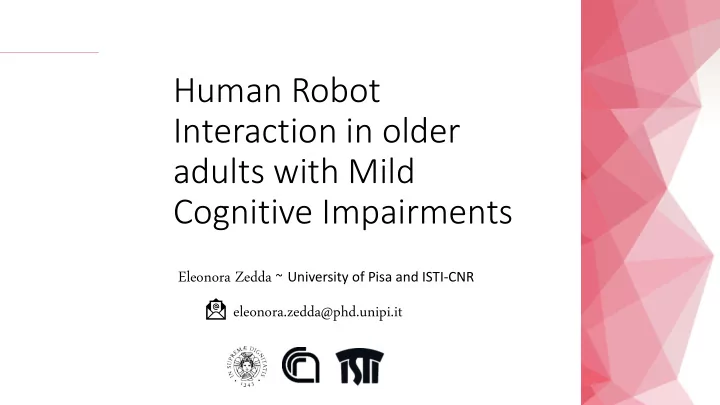

Human Robot Interaction in older adults with Mild Cognitive Impairments Eleonora Zedda ~ University of Pisa and ISTI-CNR eleonora.zedda@phd.unipi.it
Outline Motivation Cognitive Degeneration Mild Cognitive Impairments Socially Assistive Robots First study Preliminary Results Future Works
Motivation-Aging of Italian Population Average Age istat.it
Motivation-Aging of Italian Population Average Age Average Age 2017 istat.it
Motivation Degeneration in cognitive and physical domain Increased number of caregivers Gap health system Assistive technologies
Cognitive Degeneration Preclinical Predementia Dementia Cognitive decline normal age Mild Cognitive Impairments (MCI) Alzheimer's disease Asymptomatic stage Severe cognitive Middle cognitive degeneration degeneration
Cognitive Degeneration Predementia Mild Cognitive Impairments completion of complex tasks reduced coordination of brain activity performance of different cognitive domains (attention, memory, ..) maintain their independence during the activities of daily living
Mild Cognitive Impairments The MCI people are at high risk of dementia; every year about 10% of MCI people progress to dementia
MCI Interventions Cognitive and physical training Improve cognitive performance Reducing the incidence of dementia. Intervene as soon as possible Assistive technologies
Assistive Technologies Assistive technologies paper-based material Assistive technologies computer-based support
Socially Assistive Robot
Socially Assistive Robotics(SAR) Providing assistance and achieving measurable progress in convalescence, rehabilitation, learning
Benefit SAR Users did not experience any anxiety Features helps the user to facilitate the interaction with the robot More engagement Different type of interaction (voice, gesture, …) Secure environments Fill the gap between current healthcare and self-care
First study HIIS Laboratory ISTI-CNR collaboration with Institute of Neuroscience-CNR Investigate how seniors with MCI relate and perceived a cognitive game accessed Goal through a humanoid robots, as a part a training program aimed to improve their cognitive status 12 Session at CNR Session 14 participants (average age 75.3) with MCI Low level of computer experience Stages Familiarization with devices Test (UES, demographic and computer experience questionnaires)
First study- Familiarization Picture taken by our group during the familiarization with the robot at the Institute of Neuroscience of CNR
First study-Test Questionnaire User Engagement Scale questionnaire Demographic questionnaire Computer experience questionnaires Tablet (control group) Groups Pepper Robot Picture taken during the Pepper Session
Pepper Robot Robot developed by Softbanks robotics Interaction is one of the key features of the Pepper robot’s capabilities Tablet Different laser sensors, cameras, tactile and movement sensors
First Study – Test set up
First study Cognitive Music Quiz Training 15 songs of 20 seconds each Recognize singer and song Memory retrograde memory (known songs) anterograde memory (unknown songs) autobiographical memory (known songs evoke personal memories) attention, memory, reasoning Domains
Game - App Ionic Game Python Connection Receives events Pepper controller
Game - Example Wrong answer Expired time Question Timer Singer
Game - Ionic App
Game Feedback Adaptive Feedback Changes depending on the answer chosen Tablet Voice Visuals Adaptive Feedback Changes depending on the answer chosen Answer Robot Voice Visuals Animation Coloured led Sounds
Game Feedback Positive feedback Negative feedback
Preliminary Results Data still under analysis Talked about the game after the training session and with persons external to the programme Game did not perceive as a tasks but as a stimolous Robot perceive as a friends and describe it in a human-like manner “Pepper you are so cute” “Ciao Pepper, you know… I woke up with back pain and I was deciding whether to come this morning ... I decided to come because I knew I would play with you”
Future works Gesture interaction Different training games for different domain (math, logical, ..) Adaptive behaviour (Reinforcement Learning) Robot Operating System (ROS) is a set of software libraries and tools that help you build robot applications
Summary Motivation of the study linked with the aging of population and the increased of cognitive impairments create a gap in the health system The benefit of the Socially Assistive robot as an Assistive technologies to fill the gap in the health system Develop a cognitive training for elderly with MCI using a Socially Assistive Robot Preliminary results of the project and future works
References Bechade, Lucile, et al. (2019) Towards Metrics of Evaluation of Pepper Robot as a Social Companion for the Elderly . In Advanced Social Interaction with Agents. Lecture Notes in Electrical Engineering , 89-101. Springer, Cham. DOI: https://doi.org/10.1007/978-3-319-92108-2_11 Pandey, A.K., and Gelin, R. (2018) A Mass-Produced Sociable Humanoid Robot: Pepper: The first Machine of Its kind , IEEE Robotics & Automation Magazine . 25(3), 40-48, DOI: 10.1109/MRA.2018.2833157 Calvo, R. A., D’Mello S., et al. (Eds.). (2015). The Oxford Handbook of Affective Computing . Oxford University Press. USA. DOI: 10.1093/oxfordhb/9780199942237.001.0001 Pino, Olimpia, et al. (2019) The Humanoid Robot NAO as Trainer in a Memory Program for Elderly People with Mild Cognitive Impairment. International Journal of Social Robotics , 1-13. DOI: https://doi.org/10.1007/s12369-019-00533-y Broekens, J., and Chetouani . (2019) “ Towards Transparent Robot Learning through TDRL-based Emotional Expressions . IEEE Transactions on Affective Computing. DOI: 10.1109/TAFFC.2019.2893348
Recommend
More recommend